Quandrixing - Quandrixing
More Posts from Quandrixing and Others
Its a cool idea but don't think Vivienne would care enough about the Inquisitor or Dorian to do that. She has no reason to stick around after the game ends


that post was actually specifically based on this dialogue from the trespasser dlc, where we see vivienne clearly showing concern for the inquisitor and at the very least a willingness to work together with dorian to help them! and i'd have to very firmly disagree on the idea that vivienne doesn't care about dorian or the inquisitor. like. very firmly, lol.








THE BIRDCAGE — 1996, dir. Mike Nichols
figured out a way you can search for posts that are tagged TWO things on a blog!!! feeling clever
for anyone else who didn’t know, this is the format!:
https://[blogURL].tumblr.com/search/%23[tag1]%2C%20%23[tag2]
remove the [brackets] when using it!
Just an FYI. The FDA is not allowed to announce any food recalls due to the health communications pause the current administration enacted. You can still find this information by visiting USDA the site directly.
https://www.fsis.usda.gov/recalls
Here’s the fda link to use to search for recalls, safety alerts, and market withdrawals.
https://www.fda.gov/safety/recalls-market-withdrawals-safety-alerts
So, while you are making your grocery list, you may want to visit the recalls list since there’s no public communication right now.
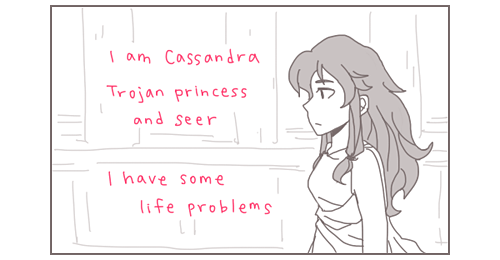
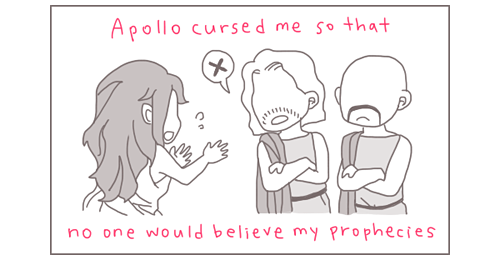
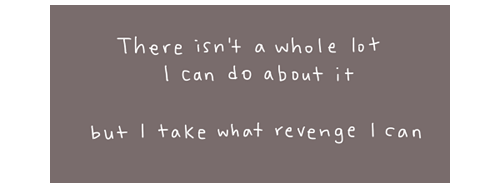
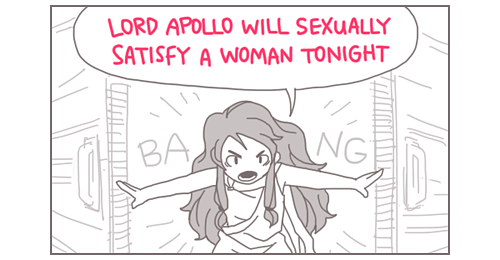
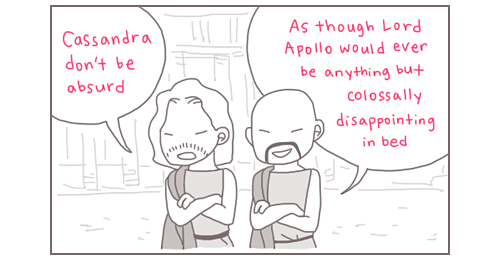

Hit him where it hurts, Cassandra! (Apollo is the WORST.)
The Neurodivergent Writer’s Guide to Fun and Productivity
(Even when life beats you down)
Look, I’m a mom, I have ADHD, I’m a spoonie. To say that I don’t have heaps of energy to spare and I struggle with consistency is an understatement. For years, I tried to write consistently, but I couldn’t manage to keep up with habits I built and deadlines I set.
So fuck neurodivergent guides on building habits, fuck “eat the frog first”, fuck “it’s all in the grind”, and fuck “you just need time management”—here is how I manage to write often and a lot.
Focus on having fun, not on the outcome
This was the groundwork I had to lay before I could even start my streak. At an online writing conference, someone said: “If you push yourself and meet your goals, and you publish your book, but you haven’t enjoyed the process… What’s the point?” and hoo boy, that question hit me like a truck.
I was so caught up in the narrative of “You’ve got to show up for what’s important” and “Push through if you really want to get it done”. For a few years, I used to read all these productivity books about grinding your way to success, and along the way I started using the same language as they did. And I notice a lot of you do so, too.
But your brain doesn’t like to grind. No-one’s brain does, and especially no neurodivergent brain. If having to write gives you stress or if you put pressure on yourself for not writing (enough), your brain’s going to say: “Huh. Writing gives us stress, we’re going to try to avoid it in the future.”
So before I could even try to write regularly, I needed to teach my brain once again that writing is fun. I switched from countable goals like words or time to non-countable goals like “fun” and “flow”.
Rewire my brain: writing is fun and I’m good at it
I used everything I knew about neuroscience, psychology, and social sciences. These are some of the things I did before and during a writing session. Usually not all at once, and after a while I didn’t need these strategies anymore, although I sometimes go back to them when necessary.
I journalled all the negative thoughts I had around writing and try to reason them away, using arguments I knew in my heart were true. (The last part is the crux.) Imagine being supportive to a writer friend with crippling insecurities, only the friend is you.
Not setting any goals didn’t work for me—I still nurtured unwanted expectations. So I did set goals, but made them non-countable, like “have fun”, “get in the flow”, or “write”. Did I write? Yes. Success! Your brain doesn’t actually care about how high the goal is, it cares about meeting whatever goal you set.
I didn’t even track how many words I wrote. Not relevant.
I set an alarm for a short time (like 10 minutes) and forbade myself to exceed that time. The idea was that if I write until I run out of mojo, my brain learns that writing drains the mojo. If I write for 10 minutes and have fun, my brain learns that writing is fun and wants to do it again.
Reinforce the fact that writing makes you happy by rewarding your brain immediately afterwards. You know what works best for you: a walk, a golden sticker, chocolate, cuddle your dog, whatever makes you happy.
I conditioned myself to associate writing with specific stimuli: that album, that smell, that tea, that place. Any stimulus can work, so pick one you like. I consciously chose several stimuli so I could switch them up, and the conditioning stays active as long as I don’t muddle it with other associations.
Use a ritual to signal to your brain that Writing Time is about to begin to get into the zone easier and faster. I guess this is a kind of conditioning as well? Meditation, music, lighting a candle… Pick your stimulus and stick with it.
Specifically for rewiring my brain, I started a new WIP that had no emotional connotations attached to it, nor any pressure to get finished or, heaven forbid, meet quality norms. I don’t think these techniques above would have worked as well if I had applied them on writing my novel.
It wasn’t until I could confidently say I enjoyed writing again, that I could start building up a consistent habit. No more pushing myself.
I lowered my definition for success
When I say that nowadays I write every day, that’s literally it. I don’t set out to write 1,000 or 500 or 10 words every day (tried it, failed to keep up with it every time)—the only marker for success when it comes to my streak is to write at least one word, even on the days when my brain goes “naaahhh”. On those days, it suffices to send myself a text with a few keywords or a snippet. It’s not “success on a technicality (derogatory)”, because most of those snippets and ideas get used in actual stories later. And if they don’t, they don’t. It’s still writing. No writing is ever wasted.
A side note on high expectations, imposter syndrome, and perfectionism
Obviously, “Setting a ridiculously low goal” isn’t something I invented. I actually got it from those productivity books, only I never got it to work. I used to tell myself: “It’s okay if I don’t write for an hour, because my goal is to write for 20 minutes and if I happen to keep going for, say, an hour, that’s a bonus.” Right? So I set the goal for 20 minutes, wrote for 35 minutes, and instead of feeling like I exceeded my goal, I felt disappointed because apparently I was still hoping for the bonus scenario to happen. I didn’t know how to set a goal so low and believe it.
I think the trick to making it work this time lies more in the groundwork of training my brain to enjoy writing again than in the fact that my daily goal is ridiculously low. I believe I’m a writer, because I prove it to myself every day. Every success I hit reinforces the idea that I’m a writer. It’s an extra ward against imposter syndrome.
Knowing that I can still come up with a few lines of dialogue on the Really Bad Days—days when I struggle to brush my teeth, the day when I had a panic attack in the supermarket, or the day my kid got hit by a car—teaches me that I can write on the mere Bad-ish Days.
The more I do it, the more I do it
The irony is that setting a ridiculously low goal almost immediately led to writing more and more often. The most difficult step is to start a new habit. After just a few weeks, I noticed that I needed less time and energy to get into the zone. I no longer needed all the strategies I listed above.
Another perk I noticed, was an increased writing speed. After just a few months of writing every day, my average speed went from 600 words per hour to 1,500 wph, regularly exceeding 2,000 wph without any loss of quality.
Talking about quality: I could see myself becoming a better writer with every passing month. Writing better dialogue, interiority, chemistry, humour, descriptions, whatever: they all improved noticeably, and I wasn’t a bad writer to begin with.
The increased speed means I get more done with the same amount of energy spent. I used to write around 2,000-5,000 words per month, some months none at all. Nowadays I effortlessly write 30,000 words per month. I didn’t set out to write more, it’s just a nice perk.
Look, I’m not saying you should write every day if it doesn’t work for you. My point is: the more often you write, the easier it will be.
No pressure
Yes, I’m still working on my novel, but I’m not racing through it. I produce two or three chapters per month, and the rest of my time goes to short stories my brain keeps projecting on the inside of my eyelids when I’m trying to sleep. I might as well write them down, right?
These short stories started out as self-indulgence, and even now that I take them more seriously, they are still just for me. I don’t intend to ever publish them, no-one will ever read them, they can suck if they suck. The unintended consequence was that my short stories are some of my best writing, because there’s no pressure, it’s pure fun.
Does it make sense to spend, say, 90% of my output on stories no-one else will ever read? Wouldn’t it be better to spend all that creative energy and time on my novel? Well, yes. If you find the magic trick, let me know, because I haven’t found it yet. The short stories don’t cannibalize on the novel, because they require different mindsets. If I stopped writing the short stories, I wouldn’t produce more chapters. (I tried. Maybe in the future? Fingers crossed.)
Don’t wait for inspiration to hit
There’s a quote by Picasso: “Inspiration hits, but it has to find you working.” I strongly agree. Writing is not some mystical, muse-y gift, it’s a skill and inspiration does exist, but usually it’s brought on by doing the work. So just get started and inspiration will come to you.
Accountability and community
Having social factors in your toolbox is invaluable. I have an offline writing friend I take long walks with, I host a monthly writing club on Discord, and I have another group on Discord that holds me accountable every day. They all motivate me in different ways and it’s such a nice thing to share my successes with people who truly understand how hard it can be.
The productivity books taught me that if you want to make a big change in your life or attitude, surrounding yourself with people who already embody your ideal or your goal huuuugely helps. The fact that I have these productive people around me who also prioritize writing, makes it easier for me to stick to my own priorities.
Your toolbox
The idea is to have several techniques at your disposal to help you stay consistent. Don’t put all your eggs in one basket by focussing on just one technique. Keep all of them close, and if one stops working or doesn’t inspire you today, pivot and pick another one.
After a while, most “tools” run in the background once they are established. Things like surrounding myself with my writing friends, keeping up with my daily streak, and listening to the album I conditioned myself with don’t require any energy, and they still remain hugely beneficial.
Do you have any other techniques? I’d love to hear about them!
I hope this was useful. Happy writing!
example: you usually play as a male character, but the character you want to romance is into fem only, so you play as fem character instead.
I feel like I should make a post about this because it’s not something that’s very well-known, and that Americans in particular may need to know about given the uncertain state of our healthcare system at the moment. I’ve wanted to write this out for a while, It’s kind of a long post, so sorry about that!
If you have an emergency and have to go to the hospital, you’ll owe the hospital a lot of money. (I got into a car wreck and broke my ankle and my arm. My hospital bill was around $20,000)
You’ll also owe the ambulance provider, if you need one. (My ambulance bill was about $800)
You may get separate bills from the anesthesiologist or surgeon. (My anesthesiologist bill was $1,700)
You may need follow-up appointments. (My orthopedic surgeon billed me for the appointments and his surgery together and it was about $1,000)
You’ve also got to pay for medical equipment you need afterward, like crutches or a walking boot. (Mine cost about $75)
Altogether, I ended up with almost $24,000 in medical debt from one car accident. That’s a really scary number for someone like me who makes $10/hr at a 12 hour a week job.
I got my debt down to $1075 by making some phone calls and submitting some paperwork.
The first thing I did was contact the hospital. They don’t make it easy to find, but many hospitals (perhaps most hospitals?) have financial assistance programs for people who can’t afford medical bills. I don’t make a lot of money, and I have bills to pay, so they were able to help me. I called the billing department and asked if they had any assistance programs for low income people who can’t pay their bills. I had to call multiple times, and I got transferred in circles by people who didn’t know what I was talking about. Finally, I got an appointment with someone in “Eligibility Services” (I don’t know what other hospitals call it, if it’s something different). I had to bring my pay stubs and copies of all of my bills. When I got to the hospital for the appointment, nobody knew what I was talking about so I had to wander a little to find where I needed to go. I spoke with the guy in Eligibility Services, and I waited for a decision on how much of the bill they would forgive. A month later, I got a call telling me it was totally forgiven.
I did the same thing for my ambulance bill and my anesthesiologist, but the process was a LOT easier. I just had to mail some paperwork and it was totally forgiven.
I didn’t bother with the medical equipment suppliers, since the bills came from separate companies and I didn’t feel like going through the process twice for $75. I was assured at the hospital that they had similar programs for debt forgiveness, so I could have probably avoided paying that too.
The only thing I couldn’t get taken care of was the surgeon/follow-up appointment cost, but they were able to put me on a no-interest payment plan.
Medical debt is scary because it’s something that can come from stuff that’s already really scary. I didn’t need the burden of $24,000 in debt on top of trying to get around on a crutch with a broken arm (it’s not easy, believe me!).. but I can’t imagine what it would be like with a bigger debt or a more severe medical emergency. I see lots of people in even worse trouble than I was in, both financially and medically. Please know that there are options for you when that GoFundMe doesn’t do enough. Even if your income is higher than mine, it’s worth a shot even for partial debt forgiveness.
Girlies and gays playing bg3
if u want a safe space to play bg3 consider joining my server for the girls and gays on discord💕
Channels include and not limited to
-memes~ ofc
-one shot~ game sessions will be in the future hosted by my friend
-rants and opinions ~so u can share ur hot takes :)
-18 plus~ incase u wanna share something so minors r safe and u can be comfortable
-multiple voice channels~ to play bg3 or just chill
Don’t be shy to DM me for more info🏳️🌈👯♀️
Server invite:




#same girl FRIED GREEN TOMATOES 1991 — dir. Jon Avnet
-
 bennedict liked this · 2 weeks ago
bennedict liked this · 2 weeks ago -
 waywardstoryenthusiast reblogged this · 2 weeks ago
waywardstoryenthusiast reblogged this · 2 weeks ago -
 hansvlitz liked this · 2 weeks ago
hansvlitz liked this · 2 weeks ago -
 waywardstoryenthusiast liked this · 2 weeks ago
waywardstoryenthusiast liked this · 2 weeks ago -
 justalurkr reblogged this · 2 weeks ago
justalurkr reblogged this · 2 weeks ago -
 justalurkr liked this · 2 weeks ago
justalurkr liked this · 2 weeks ago -
 kirawords liked this · 2 weeks ago
kirawords liked this · 2 weeks ago -
 kurt-russett reblogged this · 2 weeks ago
kurt-russett reblogged this · 2 weeks ago -
 msbelievers liked this · 2 weeks ago
msbelievers liked this · 2 weeks ago -
 softstuff123 reblogged this · 2 weeks ago
softstuff123 reblogged this · 2 weeks ago -
 symbolicating reblogged this · 2 weeks ago
symbolicating reblogged this · 2 weeks ago -
 i-wanna-be-your-muse liked this · 2 weeks ago
i-wanna-be-your-muse liked this · 2 weeks ago -
 therealjambery reblogged this · 2 weeks ago
therealjambery reblogged this · 2 weeks ago -
 gemmahale reblogged this · 2 weeks ago
gemmahale reblogged this · 2 weeks ago -
 spiffinessabounds reblogged this · 2 weeks ago
spiffinessabounds reblogged this · 2 weeks ago -
 diagnosedbiologicalfailure reblogged this · 2 weeks ago
diagnosedbiologicalfailure reblogged this · 2 weeks ago -
 diagnosedbiologicalfailure liked this · 2 weeks ago
diagnosedbiologicalfailure liked this · 2 weeks ago -
 kairenn-n liked this · 2 weeks ago
kairenn-n liked this · 2 weeks ago -
 kalmidnight liked this · 2 weeks ago
kalmidnight liked this · 2 weeks ago -
 pencildragons reblogged this · 2 weeks ago
pencildragons reblogged this · 2 weeks ago -
 pencildragons liked this · 2 weeks ago
pencildragons liked this · 2 weeks ago -
 highlynerdy reblogged this · 2 weeks ago
highlynerdy reblogged this · 2 weeks ago -
 turquoiseorchid reblogged this · 2 weeks ago
turquoiseorchid reblogged this · 2 weeks ago -
 noorjasminezulaiqha liked this · 2 weeks ago
noorjasminezulaiqha liked this · 2 weeks ago -
 curlsandglossylips liked this · 2 weeks ago
curlsandglossylips liked this · 2 weeks ago -
 howimetyourdragon liked this · 2 weeks ago
howimetyourdragon liked this · 2 weeks ago -
 nanazlovese reblogged this · 2 weeks ago
nanazlovese reblogged this · 2 weeks ago -
 daughterofposeidon46 liked this · 2 weeks ago
daughterofposeidon46 liked this · 2 weeks ago -
 fabulousladypapillon reblogged this · 2 weeks ago
fabulousladypapillon reblogged this · 2 weeks ago -
 kuromicin liked this · 2 weeks ago
kuromicin liked this · 2 weeks ago -
 neuvirtualoasis reblogged this · 2 weeks ago
neuvirtualoasis reblogged this · 2 weeks ago -
 pinkwolpertinger liked this · 2 weeks ago
pinkwolpertinger liked this · 2 weeks ago -
 drmanahan reblogged this · 2 weeks ago
drmanahan reblogged this · 2 weeks ago -
 alexandradawe reblogged this · 2 weeks ago
alexandradawe reblogged this · 2 weeks ago -
 alexandradawe liked this · 2 weeks ago
alexandradawe liked this · 2 weeks ago -
 dunroamins reblogged this · 2 weeks ago
dunroamins reblogged this · 2 weeks ago -
 pathsofoak reblogged this · 2 weeks ago
pathsofoak reblogged this · 2 weeks ago -
 thaliaisalesbian reblogged this · 2 weeks ago
thaliaisalesbian reblogged this · 2 weeks ago -
 xianfrost reblogged this · 2 weeks ago
xianfrost reblogged this · 2 weeks ago -
 nooneishereshh reblogged this · 2 weeks ago
nooneishereshh reblogged this · 2 weeks ago -
 sketchytea liked this · 2 weeks ago
sketchytea liked this · 2 weeks ago -
 beboots reblogged this · 2 weeks ago
beboots reblogged this · 2 weeks ago -
 snapshotmaestro reblogged this · 2 weeks ago
snapshotmaestro reblogged this · 2 weeks ago -
 nova-nox reblogged this · 2 weeks ago
nova-nox reblogged this · 2 weeks ago -
 nova-nox liked this · 2 weeks ago
nova-nox liked this · 2 weeks ago -
 thymejot reblogged this · 2 weeks ago
thymejot reblogged this · 2 weeks ago -
 ghostsaberwolf reblogged this · 2 weeks ago
ghostsaberwolf reblogged this · 2 weeks ago -
 vvizzerd reblogged this · 2 weeks ago
vvizzerd reblogged this · 2 weeks ago
